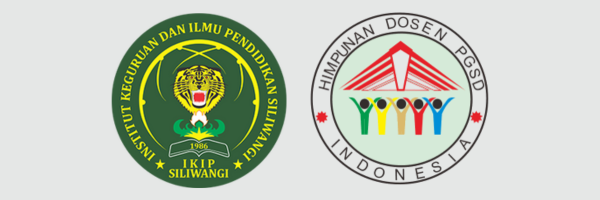SPEECH DELAY THERAPY FOR CHILDREN USING THE AAC METHOD
DOI:
https://doi.org/10.22460/pej.v4i2.1616Abstrak
The purpose of this study (1) The factors that cause speech delay in early childhood (2) The treatment given by Permata Diakonia and parents? (3) The impact of speech therapy performed by Permata Diakonia using the AAC (Augmentative Alternative Communication) method. Methods: This study used a case study method with one child data analysis used qualitative data analysis with Miles and Huberman methods. Results: Sensory therapy that was given every day since the child was diagnosed late speaking had a very significant impact on the child's environmental response. A good response to this environment is a sign that the child can be given speech therapy using the AAC method which is given twice a week. From this study, it can be concluded that speech therapy using the AAC method significantly improves children's speaking ability. It should be noted that the key to success in this therapy is not changing therapists. Implication: speech therapy using the AAC method has implications for new ideas that will give  new ideas to new approaches to enrich speech therapy.
Keywords: speech delay, sensory integration therapy, and speech therapy, AAC
Referensi
Boesch, M. C., Wendt, O., Subramanian, A., & Hsu, N. (2013). Comparative efficacy of the picture exchange communication system (PECS) versus a speech-generating device: Effects on social-communicative skills and speech development. AAC: Augmentative and Alternative Communication, 29(3), 197–209. https://doi.org/10.3109/07434618.2013.818059
Corbin, B. J., & Strauss, A. (2010). Comptes rendus, 36(2), 1–3.
Creswell, J. W. (2009). Research Desain. University Of Nebraska-Lincoln (3 rd). Los Angeles: Sage Publication. Inc. https://doi.org/10.1002/tl.20234
Creswell, J. W. (2014). RESEARCH DESIGN. (K. Koscielak, Ed.) (4 TH). Los Angeles: Sage Publication Inc. Retrieved from http://www.ghbook.ir/index.php?name=Ùرهنگ Ùˆ رسانه های نوین&option=com_dbook&task=readonline&book_id=13650&page=73&chkhashk=ED9C9491B4&Itemid=218&lang=fa&tmpl=component
Crowe, et al. (2011). Methoddssss. Business Communication Quarterly. https://doi.org/10.1177/108056999305600409
Falkus, G., Tilley, C., Thomas, C., Hockey, H., Kennedy, A., Arnold, T., … Pring, T. (2016). Assessing the effectiveness of parent-child interaction therapy with language delayed children: A clinical investigation. Child Language Teaching and Therapy, 32(1), 7–17. https://doi.org/10.1177/0265659015574918
Flores, M., Musgrove, K., Renner, S., Hinton, V., Strozier, S., Franklin, S., & Hil, D. (2012). A comparison of communication using the apple ipad and a picture-based system. AAC: Augmentative and Alternative Communication, 28(2), 74–84. https://doi.org/10.3109/07434618.2011.644579
Ganz, J. B., Hong, E. R., Gilliland, W., Morin, K., & Svenkerud, N. (2015). Research in Autism Spectrum Disorders Comparison between visual scene displays and exchange- based communication in augmentative and alternative communication for children with ASD. Research in Autism Spectrum Disorders, 11, 27–41. https://doi.org/10.1016/j.rasd.2014.11.005
Lerna, A., Esposito, D., Conson, M., Russo, L., & Massagli, A. (2012). Social-communicative effects of the Picture Exchange Communication System (PECS) in Autism Spectrum Disorders. International Journal of Language and Communication Disorders, 47(5), 609–617. https://doi.org/10.1111/j.1460-6984.2012.00172.x
McDavitt, Teresa M., Omrad, J. E. (1989). Child Development and Education. The Journal of Negro Education, 58(2), 125. https://doi.org/10.2307/2295587
Melby-Lervåg, M., Lervåg, A., Lyster, S. A. H., Klem, M., Hagtvet, B., & Hulme, C. (2012). Nonword-Repetition Ability Does Not Appear to Be a Causal Influence on Children’s Vocabulary Development. Psychological Science, 23(10), 1092–1098. https://doi.org/10.1177/0956797612443833
Mertens, D. M., & Hesse-Biber, S. (2012). Triangulation and Mixed Methods Research: Provocative Positions. Journal of Mixed Methods Research, 6(2), 75–79. https://doi.org/10.1177/1558689812437100
Onwuegbuzie, A. J., & Weinbaum, R. K. (2016). Mapping Miles and Huberman’s Within-Case and Cross-Case Analysis Methods onto the Literature Review Process. Journal of Educational Issues, 2(1), 265. https://doi.org/10.5296/jei.v2i1.9217
Papalia, Diane E., Olds, Sally W., dan Feldman, R. D. (2009). A Child’s World: Infancy Through Adolescence. USA: USA: McGraw-Hill International.
Perkins, S. (2011). Sensory Integration Therapy and Speech-Language Therapy, 2010–2012.
Purba, N., Handini, M. C. H., & Yetti, E. (2018). Development of Media Vocabulary Cards to Improve the Speech Competence of Children with Intellectual Disabilities, 6.
Purba, N., Tiar, R., Purba, L., Handini, M. C., & Yetti, E. (2019). Efektivitas Media Kartu Kosakata Di Slb / C Arrahman Jakarta, 10(1).
Schreibman, L. E. (University of C. S. D., & Stahmer, A. C. (University of C. S. D. (2014). A Randomized Trial Comparison of the Effects of Verbal and Pictorial Naturalistic Communication Strategies on Spoken Language for Young Children. Journal of Autism and Developmental Disorders, 44(5), 1244–1251. https://doi.org/10.1016/j.biotechadv.2011.08.021.Secreted
Suchowierska, M., Rupińska, M., & Bondy, A. (2013). Picture Exchange Communication System ( PECS ): A Short “ tutorial †for the doctors Picture Exchange Communication System ( PECS ): „ Przewodnik †dla lekarzy, (1), 85–90.
Sutton, J., & Austin, Z. (2015). Qualitative Research : Data Collection , Analysis , and Management, 68(3), 226–231.
Tung, L. C., Lin, C. K., Hsieh, C. L., Chen, C. C., Huang, C. T., & Wang, C. H. (2012). Sensory integration dysfunction affects efficacy of speech therapy on children with functional articulation disorders. Neuropsychiatric Disease and Treatment, 9(1), 87–92. https://doi.org/10.2147/NDT.S40499












